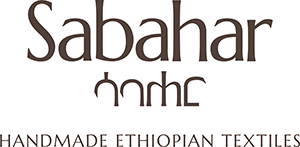DYEING
The traditional Ethiopian clothing is white with a touch of color at the bottom. This color is usually attained by weaving with imported, synthetic fibers. With the import of acrylic, Ethiopia lost its culture of using dye to tint its fabrics.
Sabahar is working to rekindle the tradition of dyeing in Ethiopia. We are one of the only small-scale weaving workshops that dyes the thread used for production.
Our dyeing process is labour intensive. The thread is first scoured, meaning it is boiled with some soda bicarbonate, in order to remove any impurities. After thorough washing, the thread is placed into the dye pot with very specific time and temperature requirements. After the color has been absorbed, the hanks are rinsed in hot and cold water, and then hung on lines in the Sabahar garden. All the dyeing is done at the Sabahar workshop. We only do small batches of thread at a time.






We are constantly striving to make our dye process as eco-conscious as possible. We use environmentally friendly chemical dyes to tint our cotton products so that they can be washed using conventional soaps and washing machines. The dyes are all AZO free and REACH certified.
We try to dye as much as possible with cold-water dyes in order to diminish our use of gas and electricity. When we do need hot water for washing, natural dyes and some conventional dyeing, we have installed solar panels to reduce our dependency on electricity. We also use biogas (from our toilet) to operate one of the burners for our pot dyeing. We have a water purification and recycling system in place as well.




